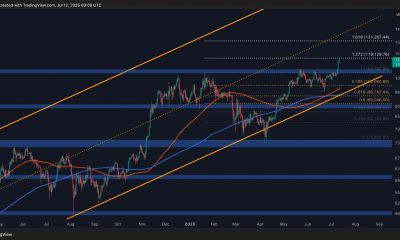Stock Markets
Wall Street rallied, but statistical data, debt ceiling held back the rebound in stocks

The Dow Jones and S&P 500 indices ended Monday’s trading in small plus after data on industrial production increased concerns about the slowing U.S. economy, which may contribute to lower inflation, while in Washington the debate on the debt ceiling continues.
The day before data showed that the business climate index of the Federal Reserve Bank of New York in May fell again, more than forecast.
In addition, markets were under pressure because of the standoff between the White House and Republicans in negotiations over the borrowing limit: the next meeting is scheduled for Tuesday, but many doubt that an agreement will be reached.
The Dow Jones index closed up 0.14% to 33,348.6 points, the S&P 500 rose 0.3% to 4,136.28 points and the Nasdaq rose 0.66% to 12,365,209 points.
Shares of Meta Platforms Inc gained 2.2% after broker Loop Capital upgraded its recommendation for the company’s securities to “buy” from “hold.”
Two U.S. Federal Reserve officials said Monday that stubbornly high inflation calls for continuing tight monetary policy at the Fed, rather than easing it.
Investors’ attention is focused on a speech by Jerome Powell, the head of the U.S. regulator, on Friday.
ONEOK Inc shares sank 9.1 percent after the company agreed Sunday to buy U.S. pipeline operator Magellan Midstream Partners MMP in an equity-and-cash transaction worth about $18.8 billion, including debt. Magellan shares jumped nearly 13%.
Earlier, we reported that U.S. stock indices decline after country statistics publication.
Stock Markets
Bitcoin’s new record lifts industry stocks ahead of ‘Crypto Week’ in Washington
Stock Markets
S&P 500 climbs to keep record in sight as chip stocks ride ongoing AI-led demand
Stock Markets
Deutsche Bank starts Cinemark at Buy as it sees box office recovery driving cash

 Forex3 years ago
Forex3 years agoForex Today: the dollar is gaining strength amid gloomy sentiment at the start of the Fed’s week

 Forex3 years ago
Forex3 years agoUnbiased review of Pocket Option broker

 Forex3 years ago
Forex3 years agoDollar to pound sterling exchange rate today: Pound plummeted to its lowest since 1985

 Forex3 years ago
Forex3 years agoHow is the Australian dollar doing today?

 Cryptocurrency3 years ago
Cryptocurrency3 years agoWhat happened in the crypto market – current events today

 World3 years ago
World3 years agoWhy are modern video games an art form?

 Commodities3 years ago
Commodities3 years agoCopper continues to fall in price on expectations of lower demand in China

 Economy3 years ago
Economy3 years agoCrude oil tankers double in price due to EU anti-Russian sanctions




























